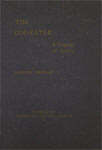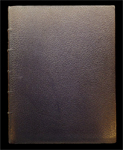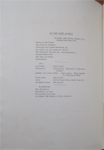100th
MP

|
THE
100th
MONKEY
PRESS |
|
|
|
Limited Editions by Aleister Crowley & Victor B. Neuburg |
|
Bibliographies |
|
Download Texts
»
Aleister
Crowley
WANTED !!NEW!!
|
|
THE GOD-EATER |
|
Image Thumbnails |
||||||||||||||||||||||
|
Title: |
The God-Eater. A Tragedy of Satire. |
|
||||||||||||||||||||
|
Variations: |
|
|||||||||||||||||||||
|
Publisher: |
Charles Watts & Co., 17 Johnson's Court, Fleet Street, London, E.C.1 |
|||||||||||||||||||||
|
Printer: |
R. Clay and Sons, Ltd., Bread St. Hill, E.C., and Bungay Suffolk.1 |
|||||||||||||||||||||
|
Published At: |
London.1 |
|||||||||||||||||||||
|
Date: |
||||||||||||||||||||||
|
Edition: |
1st Edition. |
|||||||||||||||||||||
|
Pages: |
32.1 |
|||||||||||||||||||||
|
Price: |
Priced at two shillings and sixpence.1 |
|||||||||||||||||||||
|
Remarks: |
There may be variations in the publisher's imprint. Reports of possible variations include ‘Chas. Watts & Co.’ and ‘Watts & Co.’.2, 6, 7, 8 A binding variation of State (b) has been reported with purple camel’s hair wrappers lettered in yellow.8 On 13 July 1903, Crowley went to Edinburgh to restock the Boleskine wine cellar4 and engage a companion housekeeper. During the two or three days he spent there he composed The God Eater.5 |
|||||||||||||||||||||
|
Pagination:2 |
|
|||||||||||||||||||||
|
Contents: |
|
|||||||||||||||||||||
|
Author’s Working Versions: |
|
|||||||||||||||||||||
|
Other Known Editions: |
|
|||||||||||||||||||||
|
Bibliographic Sources: |
|
|||||||||||||||||||||
|
Comments by Aleister Crowley: |
I engaged a companion-housekeeper easily enough. What a man wants is a woman whom he can take down from the shelves when required and who can be trusted to stay on them when not. It is true that a woman is much more amusing when she possesses individuality and initiative, but it is the basest kind of sensuality to wish to be amused. The ideal woman should prevent a man from being amused or disturbed in any way, whether by his won passions or the incidents of everyday life. I forget the surname of the lady whom I chose to fill this important position. Let her stand in history by the unassuming title of “Red-headed Arabella”. It was arranged that she should come and take up her duties towards the middle of August. I only stayed two or three days in Edinburgh and, having attended to the matter of wine and woman, completed the triad by writing The God-Eater. This sort play is singularly unsatisfactory as a work of art, but extremely significant as a piece of autohagiography. The explanatory note in my Collected Works is itself obscure. The idea of this obscure and fantastic play is a follows: By a glorious act human misery is secured (history of Christianity). Hence, appreciation of the personality of Jesus is no excuse for being a Christian. Inversely, by a vile and irrational series of acts human happiness is secured (story of the play). Hence, attacks on the mystics of history need not cause us to condemn mysticism. — The Confessions of Aleister Crowley. New York, NY. Hill and Wang, 1969. Page 360. ______________________________
My activities as a publisher were at this time remarkable. I had issued The God-Eater and The Star & the Garter through Charles Watts & Co. of the Rationalist Press Association, but there was still no such demand for my books as to indicate that I had touched the great heart of the British public. I decided that it would save trouble to publish them myself. I decided to call myself the Society for the Propagation of Religious Truth, and issued The Argonauts, The Sword of Song, the Book of the Goetia of Solomon the King, Why Jesus Wept, Oracles, Orpheus, Gargoyles and The Collected Works. I had simply no idea of business. Besides this, I was in no need of money; my responsibility to the gods was to write as I was inspired; my responsibility to mankind was to publish what I wrote. But it ended there. As long as what I wrote was technically accessible to the public through the British Museum, and such places, my hands were clean. — The Confessions of Aleister Crowley. New York, NY. Hill and Wang, 1969. Page 406. |
|||||||||||||||||||||
|
Reviews: |
Symbolic poetry does not seem so soul-satisfying as the more substantial sort. John Gilpin, for example, or “Father, dear father, come home with me now,” or “Good-bye, Dolly, I must leave you,” or something of that kind, seems preferable, if only because more tangible, to such airy, misty, gleamy, glamorous, and ghostly things as this so-called tragedy of satire. The poem, which is in dramatic form, makes allusions to the researches into the origin of religion made by philosophers and by inquirers like the writer of “The Golden Bough,” and its action represents how, working under the spell of the hag of eternity (as the principal lady of the piece is, more poetically than politely, called), a brother intoxicates his sister by giving her hashish to drink and then kills her, with the result that she comes to be worshipped as a goddess, and the brother, learning this, dies satisfied. Free is not the word for the treatment this theme receives. The piece goeth as it listeth, showing indeed a certain not uninteresting skill in the making of nebulous evasions in speech, but never, as Hamlet might say, coming to Hecuba. —The Scotsman, 23 November 1903. ______________________________
. . . The play awakens a curious sense of sympathy. . . . —The Glasgow Herald, date unknown.
______________________________
From the same publishers [Watts and Co.], got up in artistic form, with rough edges and broad margins, comes “The God Eater: A Tragedy of Satire,” by Aleister Crowley. So far as we can understand the story, which is almost unintelligible, it is about a brother who seeks to found a new religion, of which his younger sister shall be the goddess, and, in order to achieve that end, stabs her and eats her heart. It is simply loathsome and horrible. —The Sheffield Daily Telegraph, 20 November 1903.
|
|||||||||||||||||||||










